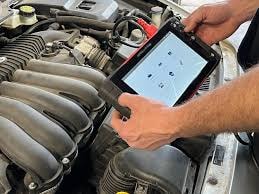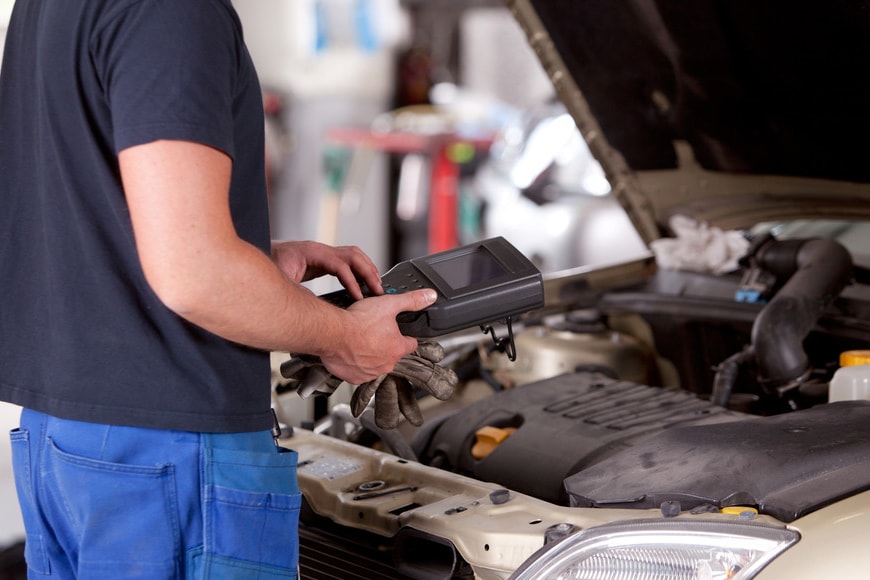The Importance of Engine Diagnostics – Metric Motors
Your car’s engine is a complex machine with many individual components. When one of those parts starts to fail, it can have a ripple effect that impacts the rest of the engine. That’s why it’s so important to have regular engine diagnostics performed. These diagnostic tests can identify potential problems early on before they have a chance to cause extensive damage.
What is Engine Diagnostics?


Engine diagnostics is an important tool for keeping your car in good working condition. By hooking up your car to a diagnostic tool, you can run a series of car diagnostic tests that will check for potential problems with the engine. This process involves connecting the vehicle’s onboard computer to a specialized computer that reads stored information and trouble codes. These tests can identify sensors that are not functioning properly, ignition coils that are failing, or parts that are starting to wear out, such as spark plugs or the fuel injector. By catching these problems early, you can avoid more serious and expensive repairs down the road.
In addition, engine diagnostics can help you improve your gas mileage by making sure that the engine is running at peak efficiency. A thorough diagnostic service includes a digital analysis of the vehicle’s systems and a visual inspection of the engine’s components, such as the oil tank and fuel injectors. As a result, engine diagnosis is an important part of maintaining your car, helping to ensure that it runs smoothly and efficiently.
Why is Engine Diagnostics Important?


Your car’s engine is one of the most complex and important parts of the vehicle, and it needs to be properly maintained in order to run efficiently. That’s why regular engine diagnostic services are so important. By identifying potential problems early on, you can have them fixed before they cause extensive damage to the engine. Additionally, regular car diagnostic tests can help improve your car’s fuel efficiency and performance. For instance, a check engine light or other warning light on your dashboard is a signal that you need to have a diagnostic test performed.
Moreover, car diagnostic tests can identify error codes that indicate specific problems, such as issues with the fuel injector or the ignition coils. Technicians use these codes, along with a visual inspection and digital analysis, to pinpoint the exact cause of the issue and recommend the appropriate repair. Early detection of these issues can potentially save you a lot of money in repairs down the road. For example, identifying a problem with the spark plugs or the oil tank early on can prevent more severe engine problems later.
Furthermore, regular diagnostic service can alert you to manufacturer notifications or recalls that may affect your vehicle. Keeping up with these notifications and performing recommended repairs can enhance your vehicle’s performance and longevity. So if you want to keep your car running smoothly, be sure to schedule regular engine diagnostic appointments with your mechanic.
How Often Should Engine Diagnostics Be Performed?


Most experts recommend having engine diagnostics performed every 12,000 miles or so. However, this may vary depending on the make and model of your car. Consult your owner’s manual or ask your technician for guidance on how often you should have this service performed. Regular diagnostic service helps to identify potential problems with your engine, and can help to prevent major issues from developing. In addition, regular diagnostics can help to improve your fuel efficiency and reduce emissions.
Technicians use diagnostic tools to run comprehensive tests on your vehicle’s systems, checking for any stored information that may indicate problems. This includes checking the oil tank, fuel injectors, spark plugs, and other individual components of the engine. As a result, it is generally recommended that you have this service performed at least once a year, often in conjunction with other routine maintenance like an oil change.
Conclusion
If you want to avoid costly repairs and keep your car running smoothly, then regular engine diagnostics are a must. These diagnostic tests can identify potential problems early on before they have a chance to cause extensive damage. Most experts recommend having this service performed every 12,000 miles or so. However, this may vary depending on the make and model of your car. Be sure to consult your owner’s manual or ask your mechanic for guidance on how often you should have this service performed.
Regular engine diagnostics help maintain the health of your vehicle by catching issues early, improving fuel efficiency, and ensuring that the engine runs efficiently. This preventive measure not only enhances the performance and longevity of your car but also saves you money by preventing major repairs. Keep your car’s engine in top condition by scheduling regular diagnostic services with your local store or trusted technician.
FAQ: Engine Diagnostics – Metric Motors
1. What is engine diagnostics?
Engine diagnostics is a process that involves connecting your car to a diagnostic tool that communicates with the vehicle's onboard computer. This process runs car diagnostic tests to identify potential issues by reading trouble codes and error codes, helping to maintain your car's engine and other systems in good working condition.
2. Why is the check engine light on?
The check engine light is a warning light indicating that the vehicle's onboard computer has detected an issue with the engine or other systems. It could be due to a variety of reasons, such as problems with the spark plugs, fuel injector, ignition coils, or other individual components. A car diagnostic test can pinpoint the exact cause.
3. How often should I perform engine diagnostics?
Most experts recommend having engine diagnostics performed every 12,000 miles or at least once a year. However, this may vary depending on your vehicle's make and model. Consult your owner's manual or ask your technician for specific guidance.
4. What are the benefits of regular engine diagnostic services?
Regular engine diagnostic services can identify potential problems early, preventing extensive damage and costly repairs. They help improve fuel efficiency, reduce emissions, and ensure the engine runs efficiently. Diagnostics can also alert you to manufacturer notifications or recalls that may affect your vehicle.
5. What is included in an engine diagnostic service?
An engine diagnostic service includes connecting the vehicle's onboard computer to a diagnostic tool, running digital analysis and car diagnostic tests, and reading trouble codes and error codes. It also involves a visual inspection of the vehicle's systems, such as the oil tank, fuel injector, and other individual components, to identify any issues.
6. Can engine diagnostics help improve my car's fuel efficiency?
Yes, engine diagnostics can help improve your car's fuel efficiency by ensuring that the engine runs at peak performance. By identifying and fixing issues like malfunctioning sensors, worn-out spark plugs, or problems with the fuel injector, your vehicle can operate more efficiently, saving you money on fuel.
7. What should I do if my car experiences drivability issues?
If your car experiences drivability issues, such as stalling, rough idling, or poor acceleration, it is important to have an engine diagnostic service performed. These issues can often be traced back to problems with the engine or other systems, and a diagnostic test can identify the cause and recommend the necessary repair.
8. How does a diagnostic tool work?
A diagnostic tool works by connecting to the vehicle's onboard computer and running a series of tests. It reads stored information, trouble codes, and error codes to identify issues within the engine and other systems. This information helps technicians diagnose and fix problems efficiently.
9. What are some common issues detected during engine diagnostics?
Common issues detected during engine diagnostics include malfunctioning sensors, faulty ignition coils, worn-out spark plugs, problems with the fuel injector, and issues with the oil tank. These problems can trigger the check engine light and affect the overall performance and efficiency of the vehicle.
10. Where can I get engine diagnostic services performed?
Engine diagnostic services can be performed at your local store, automotive service centers, or by a trusted technician. It's important to schedule regular diagnostics to maintain the health of your car's engine and other systems, ensuring your vehicle runs smoothly and efficiently.







